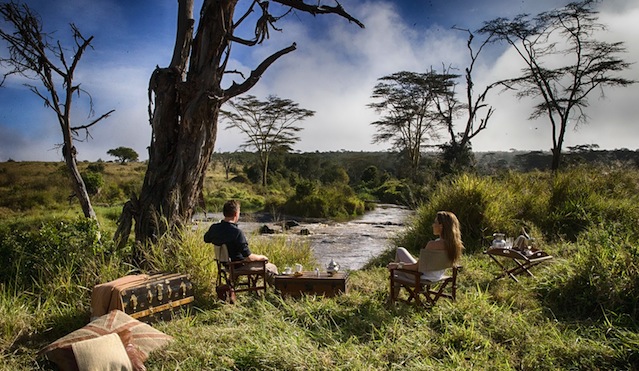By Sarah Fox
Embracing an eco-friendly lifestyle is becoming common practice for many people in today’s world. The same applies to the way in which people are choosing to travel.
Of the many destinations and ways to spend a holiday, nothing is quite like an African safari — the exotic landscapes, fascinating wildlife and luxury eco-friendly accommodations make a journey such as this unforgettable.
To ensure the lodge you choose is making as great an effort as possible to protect the local environment and surrounding communities, it’s important to identify certain tell-tale signs and, as an educated traveler, specific questions to ask before booking a stay:

Photo by Dana Allen
- Does the lodge hold any awards for responsible tourism or conservation endeavours? Such awards can provide you with a level of confidence and trust that the camp will deliver eco-values that will align with yours.
- What is the camp’s recycling policy? Many lodges practice in-house recycling, with the likes of plastic bottles becoming a reusable resource. Main camp wastage is usually sent to the nearest city to be recycled.

Photo by Caroline Culbert
- Do they have socially responsible community tourism policies? The local people can greatly benefit from the involvement of safari operators in developing schemes that initiate clean water programmes, train teachers and pupils in environmental awareness and build new classrooms and clinics within the community.
- An old favourite of many camps and lodges is the use of solar panels. This is the perfect and effective way to generate power in sunny Africa.

Photo by Mike Myers
- What kind of an impact does the property have on the surrounding area? No one wants a hotel complex destroying the beauty of African savannah, which is why the best lodges are low-impact, low-volume, blending seamlessly with the landscape. Some lodges will even “˜lease’ the land from the rural local communities and provide employment opportunities, allowing locals to benefit from the lodge’s commercial success.
- What kind of materials are the facilities and buildings made from? Recycled material is used by some camps and lodges to create original furnishings while other properties are comprised entirely from natural resources.

Photo by Mike Myers
- Do they boast the traditional eco, bucket showers and eco-loos? While simple touches, these are still effective tools in helping a lodge achieve its sustainability goals.
- Does the camp or safari operator possess a strong understanding of the local ecology? A good biodiversity conversation programme is always something to watch out for ““ it is vital that the lodge protects and effectively manages the local ecosystems and wildlife.
- Is the lodge attached to a charity or non-profit trust? By aligning yourself with them you can ensure your stay will provide a contribution to a worthwhile cause that you will be happy to support.

Photo by Caroline Culbert
Perhaps the most rewarding part of staying in an eco-safari lodge is being able to witness first-hand how your money is used for positive benefit, both in maintaining the spectacular beauty of Africa’s vast and contrasting landscapes and also in uplifting the many rural communities that gain so much from sustainable tourism.
About the Author
A native of South Africa, Sarah Fox has a phenomenal passion for travel. Having worked and travelled extensively across Africa, her love for the continent is only furthered by her job, working with luxury African travel specialists, Mahlatini.
Feature photo by Michael Poliza
*This article as brought to you by Mahlatini Luxury Travel




